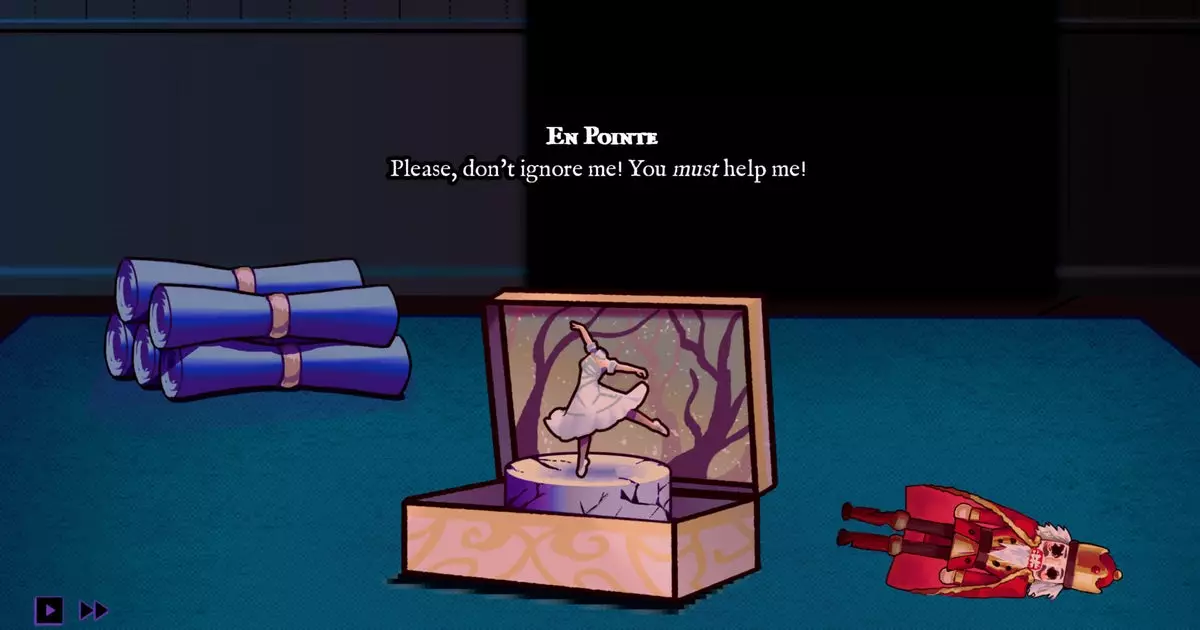At first glance, Toy Box presents itself as a whimsical adventure, reminiscent of holiday cheer and nostalgic playthings. However, upon watching the trailer, one quickly discerns that this is no ordinary game. Instead, it unfurls as a free visual novel that dives headfirst into a macabre world teeming with unsettling themes and dark puzzles. The player embodies a toy inspector tasked with the grim duty of disassembling toys under the supervision of the mysterious Grand Toy Maker, an enigmatic figure whose visage remains concealed at the top of the screen. This game ingeniously navigates the treacherous waters between innocence and malevolence, crafting an experience that lingers in the mind long after the screen goes dark.
As the inspector, the player encounters five sentient toys, each equipped with distinct personalities and haunting backstories. The central mechanic revolves around the choice to either “salvage” these creatures, reflecting a compassionate response, or “sentence” them to incineration, a chilling prospect that evokes a myriad of moral questions. Much like a contemporary reinterpretation of the fairy tale Pinocchio, these toys not only possess life but also harbor painful memories that surface as the player unravels their plush shells. This psychological depth significantly contributes to the unsettling nature of the game, forcing players to confront the idea of sentient objects and the ethics of their destruction.
Despite the initial allure of colorful toys, the narratives built within Toy Box are steeped in horror. While the game refrains from explicit depictions of sexual violence, it indulges in a range of disturbing themes, including bloody violence, body horror, and the loss of innocence. It is here that the game truly shines—or rather, casts a shadow—on the perceptions of childhood and play. The toys converse with the player, voicing disquieting tales of their origins, filled with suffering and pain, making the act of disassembly not merely a mechanical task but an emotionally charged experience.
What sets Toy Box apart is its refusal to wallow in gratuitous gore or shock for the sake of sensationalism. Instead, it establishes a chilling atmosphere that evokes a broader commentary on the darker aspects of humanity. The developers, DEADline Studios, a small POC and Queer-owned venture, inject insights into the multifaceted nature of existence, exploring the interplay of good and evil in a compelling way. Their intent resonates with those who appreciate narrative depth and innovative storytelling, utilizing horror as a lens through which to view the existential aspects of life.
The concept of dismantling objects to reveal their stories stands out as a remarkable premise that invites further exploration, particularly in genres beyond horror. The simplicity of the mechanic combined with the intricacies of character backstories creates an engaging framework. While Toy Box leans heavily into its dark themes, it inadvertently highlights the potential for creating heartwarming or thought-provoking narratives through similar mechanics. Comparatively, games like Hardspace: Shipbreaker address societal issues through a different narrative lens, presenting the aspect of breaking down and repurposing while lacking the emotional weight found in Toy Box. This call for more diverse storytelling methods perhaps signals fertile ground for developers to explore.
Toy Box is not for the faint-hearted; its unsettling themes and the moral implications of its gameplay may evoke strong reactions from players. Nevertheless, it embodies a unique exploration of innocence distorted by the horrors of existence, ultimately challenging our perceptions of toys as proxies for childhood joy. By delving into the disassembled lives of its characters, the game forces a confrontation not just with their troubling pasts, but with our own humanity and moral choices. In a saturated industry often glossed over with lighthearted narratives, Toy Box stands out as a profound testament to the potential of gaming as an art form that dares to delve into the deeper, scarier facets of life.


Leave a Reply